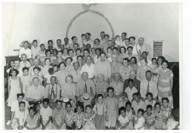A Conversation with lavella hyter

Mikaili Azziz

LaVella Hyter
Though most know LaVella Hyter for her role as president of Roberts Settlement—her history with the not-for-profit runs deep.
Thirty miles north of Indianapolis just to the east of U.S. 31 on 276th Street in western Jackson Township, Hamilton County, Indiana, stand the remains of an African-American pioneer farm settlement. It was founded in 1835 by free Blacks of mixed racial heritage who migrated mostly from North Carolina and Virginia to escape deteriorating racial conditions in the South.
(from RobertsSettlement.org)
Raised in the settlement, which is part of the very land that is now listed on the National Register of Historic Places, Hyter is especially passionate about upholding the family legacy.
Tell us a bit about your personal connection to the settlement.
Hansel Roberts, one of the three pioneers of Roberts Settlement, was my four times great grandfather. I was raised in the settlement until I was about 14, and we lived on a farm about two miles from the chapel. My great-grandmother, Lucetta Roberts Gilliam, also had a farm nearby.
In the early 50s and mid-60s, I would say there were roughly a dozen or so families still living there in the community. We had corn, soybeans – even a dairy farm. As an outdoor girl, I was like my dad’s shadow. I was one of eight siblings and didn’t much care for the indoor life. I worked with my dad in the field: milking the cows, plowing, planting corn, feeding the chickens and hogs, and so on.
What barriers did the settlement’s pioneers face in the early days?
They were fortunate, at that time in Indiana, to be able to secure land at all. First, they’d gone to the Beech Settlement in Rush County, but all that land had been taken up. They then ventured into the northern part of Hamilton County to assess the area and decided that the land would be suitable for locating to that area.
Considering the roadblocks that the settlement’s pioneers faced – have there been any barriers in more recent years? How receptive has the local community been to the existence of the settlement?
I actually have a short story regarding this. About a year ago, we welcomed third or fourth-grade students from Hamilton Heights Elementary to the settlement for a class field trip. Two buses pulled in, and we stood in front of them to greet the students as they made their way off the bus.
A little boy steps off the bus, and in a soft voice, he tells me, “I’m sorry they tried to make you slaves.”
Taken aback, I replied, “Well, the good thing is that we left difficult situations in North Carolina and came here to Indiana. Our ancestors made the decision to protect us so we could have a good life.” The boy then asked how “they” were treating us in Indiana… and this is a third-grade kid! I reassured him, “we’re doing pretty well. And you know what? Sometimes in life, we all have barriers to overcome.”
The moral of that story is that historically, our family has always broken barriers. When we came to Indiana, we had to build our own school – because there was a time when we weren’t allowed to go to public school. And although we’d built that school so that our family members would have a place to be educated – we also welcomed the local white families in the area so their kids could attend. Whatever we did, we embraced others.
2023 marks a very special anniversary for Roberts Settlement: the 100th homecoming ceremony. What does this monumental anniversary mean to you?

Roberts Settlement Homecoming 1949
It’s going to be huge this year. We’re getting all kinds of calls and messages from family members all over the place, asking about this event. I got a message from one family member in Ohio who says they’ll be bringing carloads of people!
But honestly, every time I visit the settlement, I am truly humbled. I’m humbled by the vision my ancestors had. I’m humbled by their decision to leave North Carolina and Virginia, and the courage it took to protect our family. Their journey was over 700 miles long, and they even passed through the Appalachian Mountains. Mind you – there were no highways, no GPS systems – and definitely no signs that read “Next Exit: McDonald’s!”
It’s also very humbling that not many families, especially Black families, can be in this position. There were once nearly 100 Black settlements in Indiana, and today, there are only five. Roberts Settlement is one of the most viable remaining in the state, but this is much bigger than our family. It’s heartbreaking to see how over time, other families have lost ownership of their land and treasured history.
What else is on the horizon for Roberts Settlement this year?
This year, Roberts Settlement is looking forward to creating its outdoor exhibit, the Legacy Walk, to further programming of historical content concerning its pioneering experience. More information on that project is to come!
African American cultural heritage sites have historically been underrepresented and undercelebrated, particularly those associated with rural settlements of free people of color. This hidden history is integral to understanding early Midwest America settlements, and its source of pride for descendants with deep roots in these communities. This Legacy Walk is a combination of interpretive reading stations, public art and technology-enabled storytelling about the Black pioneer and will permit the public to visit at the time of their choosing.
With Roberts Settlement’s role as an integral part of the Hamilton County community — Hamilton County Community Foundation offers its continued support through its Inclusive Economic Growth pillar. Over the years, the foundation has maintained its commitment to the settlement through:
- awarding of grants
- facilitating strategic planning and fundraising of the upcoming Legacy Walk project
- acting as a liason between the settlement’s leadership and Hamilton County’s board of directors






Exciting info